I wrote in Propel’s Friday Opinion today [Friday 24 November] reflecting on an Autumn Statement that was mixed for hospitality businesses.
Here’s my full piece:
Reflections
Need to catch up on the full set of announcements in the Autumn Statement and what it means for you?
There was much anticipation heading into the Autumn Statement and rightly so given the significant economic hardship hospitality businesses are grappling with.
The overwhelming sentiment I’m hearing from the sector is frustration and I share those feelings. We were all hoping for more from the Chancellor and there are many businesses feeling like the measures announced won’t touch the edges. There will, of course, be venues that benefit from the policies announced, albeit not to an extent we would have hoped for.
Prior to the Chancellor’s statement, we had campaigned hard for action to avert the looming increases in business rates.
Specifically, we asked for the 75% relief for hospitality and leisure businesses to be extended for a year, the business rates multiplier frozen for all businesses and the cap to be increased from £110,000 to £2 million.
We engaged extensively with MPs from all parties ahead of time – holding a drop-in session in Westminster and meeting with both backbench MPs and the Hospitality and Tourism APPG. This work led to both the Chair of the APPG and a group of backbench MPs writing to the Chancellor supporting our asks.
So, what was announced?
Positives
Let’s start with the positive. Relief was extended for a year and the small property multiplier was frozen. Those are both positive measures for small businesses. While it might not be a reduction in costs, it avoids the huge business rates bill proposed in the Spring.
Alcohol duty was also frozen, something we campaigned for. Again, not a reduction in cost but it eliminates another potential cost rise.
Rates rise
Unfortunately, the Chancellor decided to increase the standard multiplier by 6.4%. The standard multiplier affects businesses representing two-thirds of hospitality’s trade and it’s hugely disappointing that the higher September figure was used, which will see rates rise by £150 million.
We’re already working on whether there could be some movement on this, and we’re urging the Government to use a lower rate – an ask I made of the Chancellor at a meeting on Wednesday night.

National Living Wage
Find out more about the exact rates for National Living Wage and other wages from 1 April next year in our guidance note.
Onto National Living Wage (NLW) – by far the biggest frustration. Another increase was no surprise, given that reaching 66% of median earnings was a manifesto commitment, but the sheer scale of the increase certainly was a shock.
The rise is 10% and 28p more than forecast in March, which is staggering. Whatever cost benefit the business rates measures will bring to businesses will be completely blown out of the water by this scale of rise. We’ve heard from one operator who shared confidentially that this alone will cost their business £3.5 million. That level of cost will not be unique.
The Government may be the ones who announce these wage rises but it’s our businesses that have to deliver them and, in the current cost of doing business crisis, that is looking like a daunting, potentially impossible challenge for many.
Our costs are already far too high and now it’s even worse. We’ve told this to the Government in no uncertain terms. If they keep stacking costs up for businesses, they will lose them and force them to shut their doors for good.
We need a much more sustainable tax burden if we’re to avoid that eventuality and pay this level of wages.
Looking forwards
The Autumn Statement may have just finished but we’re now immediately working towards the Spring Budget and General Election.
VAT needs to be on the table. It’s the single most effective measure that will bring down the tax burden for the sector and give us a fighting chance of survival.
Everyone in hospitality knows how effective it is. We felt it during the pandemic. It stimulated huge demand, drove up sales and kept prices down. Unfortunately, the impact it had seems to have been quickly forgotten in other quarters.
Yes, it will cost any government a lot in the short-term to implement but it repays itself over and over again, and should be part of a long-term strategy to drive growth in hospitality, leisure and tourism.
We also need to see business rates reform which, let’s not forget, was alongside NLW targets in the election manifesto. The system is grossly unfair for hospitality businesses.
The divide between bricks and mortar businesses and those that largely operate online is no longer a divide, it’s a growing chasm. It needs to be addressed.
We’ve been engaging with the Labour party for many months on their proposals to ditch and reform business rates to make sure it works for hospitality – both on cost and fairness.
Working on your behalf
Our work on the sector’s behalf continues at pace. We are the only body representing the entire spectrum of hospitality – from bars, pubs and restaurants to contract catering, entertainment parks, indoor leisure and much more.
While there was much missing on Wednesday, hospitality did receive some dedicated measures and that shows that our importance as a sector is recognised at the highest levels of Government.
Is there more to do? Of course. Am I often left frustrated that more isn’t being done? Definitely.
But I am committed to getting the best outcome for hospitality. I’ve been working in this sector for more than 30 years and I’m incredibly passionate about it.
I have enormous faith in hospitality and its ability to deliver for the economy, jobs and communities.
UKHospitality will keep fighting on your behalf to ensure we can achieve just that.





